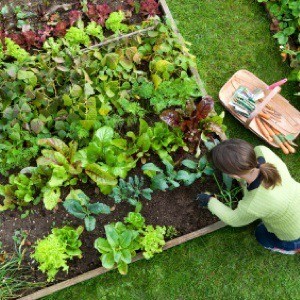
April is a great month for celebrating all things green and growing. Earth Day falls on April 22, National Arbor Day is on April 26, and the National Gardening Association designates all of April as National Garden Month. To celebrate this year, consider replacing some (or even all) of your conventional gardening methods with methods that are organic. Here are some ideas for getting started.
Switch From an Edible Garden to an Edible Landscape. Think big! Instead of planting trees, shrubs, and plants that are purely ornamental, consider mixing beauty and utility by planting edible alternatives. Examples of trees and plants that are both attractive and edible include berry-producing shrubs like blueberries, raspberries, and gooseberries; a wide variety of fruit and nut trees (apple, cherry, etc.); and edible flowers and herbs like pansies, day lilies, and nasturtiums.
Go Native. If you're adding new trees, shrubs, or plants this year, go native. Native species are well adapted to the growing conditions in your area, which mean they perform better than other plants during weather extremes and they are less susceptible to problems with pests and diseases.
Start Composting. Nature loves to recycle. All you need are some grass clippings, twigs, leaves, and food waste, and you before you know it, you've got a free, high-quality organic soil amendment for your yard and garden. From a sleek commercially designed composters to casual backyard piles, a system and technique exists for every gardener's situation and taste. The more adventurous types might even consider vermiculture (composting with worms). Whatever your preference, composting will provide your garden with a steady supply of organic nutrients, while helping reduce the amount of waste you contribute to landfills and the fossil fuels needed to get it there.
Conserve water. The water used for gardens and landscaping accounts for a large percent of our residential water use. Do your part to conserve water by repairing leaky faucets and hoses and using efficient water delivery systems like soaker hoses and drip irrigation. Select drought-tolerant ornamental plants and plant them in groups according to their water needs. Set up a rain barrel to collect runoff from your house and garage and whenever possible, plant species that are native to your area.
Power Your Own Tools. Choose hand-powered tools whenever possible. Instead of trimming to combat weeds around trees and buildings, use extra mulch. Swap your leaf blower for a rake or a broom. The air and noise pollution generated by electric and gas-powered equipment affects the environment beyond your own backyard. By switching to hand tools you'll reduce pollution and get more exercise at the same time. Sure, electric-powered tools are environmentally preferable to those run on gas, but that electricity still has to be generated somewhere and producing it causes pollution.
Shop Smarter. Buy durable goods and recyclable goods with minimal packaging. The best deal is usually isn't the cheapest product, it's the better-quality product. When making a purchase, consider how long it will last and what will happen to the product after its useful life is over. If you can, choose the product with less packaging or packaging that is reusable or recyclable.
Buy local. Support merchants, farmers, and producers locally. Money spent at locally owned businesses feeds the economic engine of your community and ensures that the farms and the food they produce will always be available. It also reduces the costs associated with transporting the product, which lowers the cost of the product, both financially and environmentally.

Add your voice! Click below to comment. ThriftyFun is powered by your wisdom!